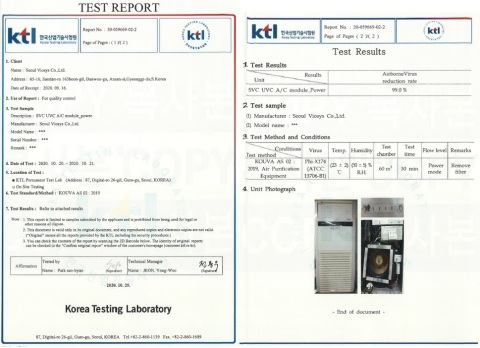ANSAN, South Korea

Seoul Viosys (KOSDAQ: 092190), a leading compound semiconductor and bio solution provider, demonstrated that an air conditioning and heating system with its ultraviolet LED Violeds modules have the performance to disinfect 99% of airborne viruses through the results of testing by Korea Testing Laboratory (KTL). The testing shows Violeds is a breakthrough technology that helps prevent the spread of COVID-19 pandemic caused by aerosolized viruses.
This press release features multimedia. View the full release here: https://www.businesswire.com/news/home/20201217005466/en/

Testing report and results for Seoul Viosys’ UV LED Violeds module by Korea Testing Laboratory (Photo: Business Wire)
This air conditioning and heating system testing with Violeds module resulted in 99% disinfection of the airborne viruses in a 60m3 room within 30 minutes. The virus used in testing is bacteriophage PhiX174 which is similar in UVC dosage to SARS-CoV-2 (Coronavirus 2).
Violeds module is an optimized solution to simultaneously enable disinfection of various viruses and bacteria in the air, as well as air purification by disinfecting the air drawn into the air conditioner and eliminating viruses in the air. The module device can be easily installed in the air conditioning and heating systems in use.
Seoul Viosys has been running a campaign to install Violeds module devices in air conditioners and heaters of applicants from August 2020 targeting public and multi-purpose facilities to help reduce both air and surface pathogens in indoor spaces.
“As the impact of the COVID-19 pandemic, according to Yole Développement, a market research company, the global market for UV LEDs is expected to grow into USD 2,786 million in 2025. So Seoul Viosys will continue to offer our patented UV LED technology with harmless effects on humans unlike mercury lamps,” said an official at Seoul Viosys.
About Seoul Viosys
Seoul Viosys is a full-line solution provider for UV LED, VCSEL (Vertical Cavity Surface Emitting Laser), the next-generation light source for 3D sensor and laser, and a single-pixel RGB “Micro Clean Pixel” for displays. Established in 2002 as a subsidiary of Seoul Semiconductor, it captured No. 1 market share in the UV LED industry (LEDinside, 2019). Seoul Viosys has an extensive UV LED portfolio with all wavelengths ranging from 200nm to 1600nm, including ultraviolet rays (UV), visible rays, and infrared rays. The company holds more than 4,000 patents related to UV LED technology. Violeds, its flagship UV LED technology, provides a wide range of industries with optimal solutions for robust sterilization and disinfection (UV-C), skin regeneration (UV-B), water/air purification and effective cultivation for horticulture. In 2018, Seoul Viosys acquired RayCan, a leading optoelectronic specialist, to add advanced VCSEL technology, which supports smartphone facial recognition and autonomous driving, and has started mass production. In January 2020, it introduced a disruptive “Micro Clean Pixel” that has the potential to be a game-changer in the display market. To learn more, visit http://www.seoulviosys.com/en/.
View source version on businesswire.com: https://www.businesswire.com/news/home/20201217005466/en/
CONTACT
Media Contacts:
Seoul Semiconductor Co., Ltd.
Jeonghee Kim
Tel: +82-70-4391-8311
Email: jeonghee.kim@seoulsemicon.com





